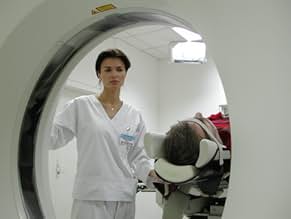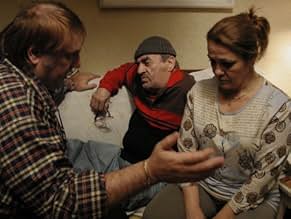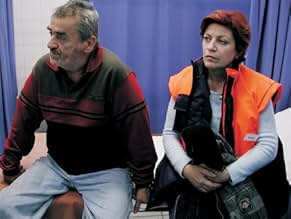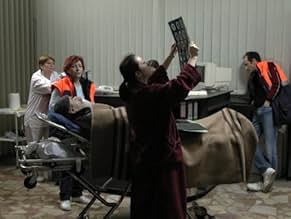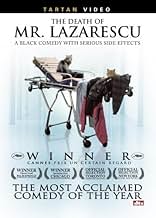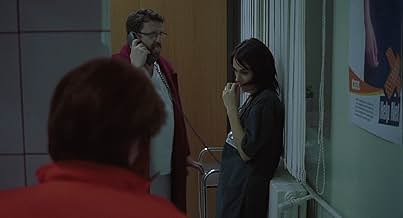Sr. Lazarescu chama uma ambulância após sofrer com dores de cabeça e de estômago. Inicia-se então uma viagem através da cidade, entre um hospital e outro, em busca de tratamento médico.Sr. Lazarescu chama uma ambulância após sofrer com dores de cabeça e de estômago. Inicia-se então uma viagem através da cidade, entre um hospital e outro, em busca de tratamento médico.Sr. Lazarescu chama uma ambulância após sofrer com dores de cabeça e de estômago. Inicia-se então uma viagem através da cidade, entre um hospital e outro, em busca de tratamento médico.
- Direção
- Roteiristas
- Artistas
- Prêmios
- 30 vitórias e 14 indicações no total
- Ambulantier
- (as Doru Boguta)
- Mr. Lazarescu (Domnui Lazarescu)
- (as Ioan Fiscuteanu)
- Direção
- Roteiristas
- Elenco e equipe completos
- Produção, bilheteria e muito mais no IMDbPro
Avaliações em destaque
Puiu's movie, inspired from true events (some years ago, a man was transported from one hospital to the other with a most tragic consequence) follows its protagonist through the final stages of his life: feeling ill, Lazarescu calls for an ambulance and awaits its (delayed) arrival drinking and making telephone calls. As the hands of the clock turn and the ambulance is nowhere to be heard or seen, the old man goes next door, trying to get some help from the neighbors: a stereotype of their kind. Once the ambulance finally arrives, Lazarescu embarks on a most dreadful road trip, from hospital to hospital, in an elaborate attempt to diagnose and operate him. The story begins.
It would be unfair not to acknowledge the film's authenticity from the outset. Truly segmented - as the director himself affirmed, regarding "Lazarescu" as the first in six stories about the Romanian capital - in several (short) "stories of Bucharest", we meet most intriguing characters and situations, each of them highly rewarding on different levels. Good doctors, bad doctors, grumpy doctors, snobbish doctors, pitiful doctors - all the guys and girls our great medical system can offer. Still, some continue to resemble human beings, which - to a certain degree - is quite an achievement.
The bad light Puiu sheds on them may be diminished by the fact that the night Lazarescu chose to fall ill was most unfortunate: a terrible car accident filled most of the hospitals so that it was extremely difficult to find a place for an old, drunk man who was automatically labeled as a drinker and treated as such. Few characters in the film show authentic sympathy for Lazarescu, as most of them just want to get on with the job and do themselves a greater good. There is no such concept of readiness to help a fellow man struggling between life and death: commodity reigns. Unlike Lazarus, our main character will most probably not rise from the dead. And the people who still stand and didn't give their everything are up to their throats in guilt.
But this is the terrible, depressing half of the story. A most regretful reality. Cristi Puiu's and Razvan Radulescu's (a bit overlong) script is at times filled with moments of sheer irony, sarcasm and cynicism, all worth their laughs. Some of these moments are brilliant. Lazarescu is witty and gutsy, as long as he can talk. He is a man who - despite what others think - wants to stand up for himself and would rather not let anyone treat him like scum. Sadly, though, all is part of a gigantic vicious circle: doctors remain people and patients are not at all different. Flawed. Yet, there is a question of humanity and dignity involved. A choice between what is right and what is easy, as the saying goes.
There are three levels one can see Puiu's film. The first is the relation between the single human and the medical system. 'Moartea domnului Lazarescu' is the anti-'ER' with the universal character of the paternal doctor, playing God just to hide his own lack of competence and his indifference is kind of universal.
Then we have the story of Dante (yes!) Lazarescu descending in five hours the spiral stairs between being a pauper drunken in today's Bucharest towards almost certain physical death. An yet, despite the gradual physical degradation admirably acted by Ion Fiscuteanu, Mr. Lazarescu keeps intact his moral and human dignity, even as he slowly slides into a comma.
I am not sure whether folks who did not live in Romania or other former communist countries will catch easily the third layer. Lazarescu lives in a world in decomposition. Dictature is gone, but no social help system replaced it, his family is far away, his neighbors are simple people, indifferent and hardly coping with their own problem. Yet, in this decrepit medium he will find in the assistant Mioara a caring person, who will not only try to save him, but will ease his last hours with the feeling that yet there is somebody who cared for him. It's not quality of life, it's more - quality of humanity.
Você sabia?
- CuriosidadesThe film was shot in 39 nights in real hospitals. It was edited in 38 days.
- Citações
Mr. Lazarescu (Domnui Lazarescu): Excuse me, Nurse, but how old are you?
Mioara Avram: I'm not that young anymore. I'm 55.
Mr. Lazarescu (Domnui Lazarescu): 55?
Mioara Avram: Yes. In September.
Mr. Lazarescu (Domnui Lazarescu): In September? Just like Virgil, my brother-in-law, only he's 68.
- ConexõesFeatured in 2006 Independent Spirit Awards (2006)
Principais escolhas
- How long is The Death of Mr. Lazarescu?Fornecido pela Alexa
Detalhes
Bilheteria
- Orçamento
- US$ 500.000 (estimativa)
- Faturamento bruto nos EUA e Canadá
- US$ 80.301
- Fim de semana de estreia nos EUA e Canadá
- US$ 5.880
- 30 de abr. de 2006
- Faturamento bruto mundial
- US$ 216.922
- Tempo de duração2 horas 33 minutos
- Cor
- Mixagem de som
- Proporção
- 1.85 : 1
Contribua para esta página



